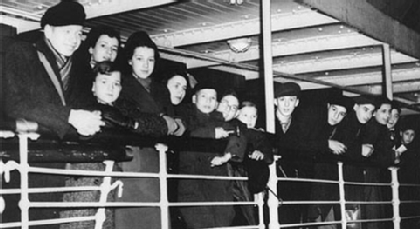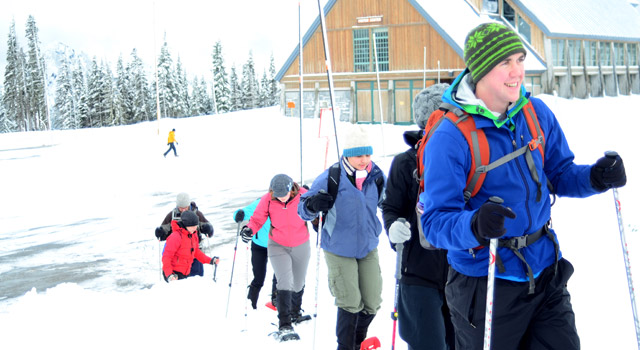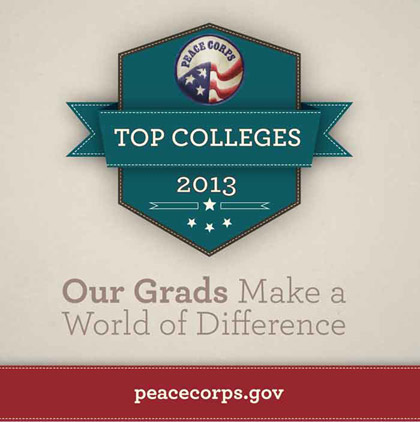Page 183 • (2,621 results in 0.025 seconds)
-
January 18, 2008 T-shirts make a splash in Brazil It’s a simple T-shirt, black cotton with silk-screened words. The white “Sojourner” across the chest identifies the PLU students as temporary guests in another country. The phrase “global citizen,” screened in Portuguese, English and Spanish on the back, represents the countries the students are visiting – Brazil and Argentina. The students are investigating the impact of globalization on South America. They are one of 27 groups currently
-
graduated from PLU with degrees in education. For the next 15 years, Keith taught English in the Federal Way School District, while Clarice taught music in the Highline School District before becoming a stay-at-home mom. When a 10-acre spread became available next to the family ranch, the Swansons jumped at the chance to go into the business and embrace a new way of life. “We’d taught for years, it was time to try something else,” Keith Swanson said. “This way our five kids could run around, and they
-

February 9, 2011 PLU graduate studies the Kindertransport By Barbara Clements Their faces stare out from yellowed passport photos. Some are smiling. Some scared. Some of carrying suitcases. Many are only holding their younger siblings or nothing at all. This photo is of the first transport from Berlin as it embarks at the Hook of Holland, December 1, 1938. (United States Holocaust Memorial Museum) These are the children of the Kindertransport of 70 years ago, when a hodgepodge of English
-

sledding evolved into racing down the mountainside, until his snowshoe would get stuck in the powder, sending him flying head-over-heels downward and then to a halt. “I like tumbling,” Hundtofte said rather matter of factly. “The snow doesn’t hurt.” His ability to get right back up after his falls encouraged English and Global Studies double major Maylen Anthony ’16 and nursing major Nina Dam Pedersen ’14 to join in the fun. Pedersen, a Denmark-native studying at PLU for just three-and-a-half months
-

positions require a bachelor’s degree. Americans with backgrounds in agriculture, environment, teaching English as a second language, and other technical or language skills related to Peace Corps assignment areas are encouraged to apply for service one year in advance of their target departure date. The next application deadline is February 28, 2013. The Peace Corps ranks Top Colleges annually according to the size of the student body. Small schools have less than 5,000 undergraduates, medium-sized
-

sizes where professors knew my name and offered office hours to chat about academics, career options and life in general. How did your experience and background prepare and inspire you for your new role as Director of Career, Learning & Engagement? Working with teenagers (as a high school English teacher) taught me that one of my biggest passions is helping students find their vocational calling, and then helping them turn their dreams into reality. Are you working on any projects that you would
-

support to his fellow Cross Country teammates. Sincerely, Thomas W. Krise, Ph.D. President and Professor of English Tom Pfeifle at PLU's EXPLORE! Retreat 2016 at the Dumas Bay Centre in Federal Way, Wash. (Photo: Hansel Doan) *Note: All comments are moderated Read Previous 133 AND COUNTING: The tragic shooting in Orlando and the need for new gun control measures Read Next Opening Remarks for Convocation 2016 LATEST POSTS President Krise’s open letter of support for Muslim community January 30, 2017 An
-
malaria work in Senegal with their own volunteers. Bonnie Nelson ’08 served in Mongolia (2011-2013) where she worked as a Community Development Volunteer in Baruun-Urt. While in the Peace Corps, she taught English at the Mongolian University of Science & Technology, as well as participated in local community led projects including the Good Father Project and Awesome Mongolia. Bonnie is currently a service-learning coordinator at Seattle University. At PLU, she majored in psychology.
-
English we encounter the German loan word “Geist” in the term Zeitgeist, which describes the spirit of a particular historical juncture.) German speakers have become household names in the fields studied by humanities scholars, whether in literature (Johann Wolfgang von Goethe, the brothers Grimm, Franz Kafka), film (Werner Herzog, Wim Wenders), music (Wolfgang Amadeus Mozart, Johann Sebastian Bach, Ludwig van Beethoven), art (Caspar David Friedrich, Anselm Kiefer, Gerhard Richter), philosophy
-
Timely Research Translating the Enlightenment The National Endowment for the Humanities (NEH) recently awarded Professor of French Rebecca Wilkin a $133,333 grant under the Scholarly Editions and Translations interest area. Wilkin and her collaborator Angela Hunter, an English professor from the University of Arkansas at Little Rock,… November 1, 2021 MathematicsPsychology
Do you have any feedback for us? If so, feel free to use our Feedback Form.


